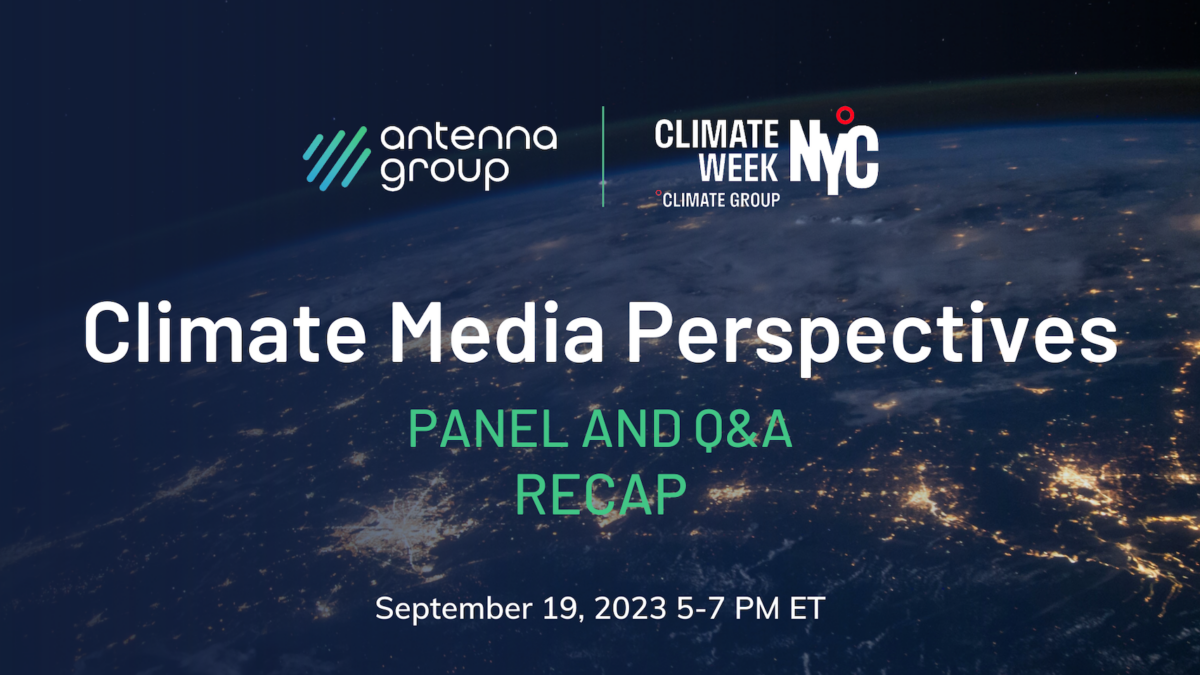
On Tuesday, September 19th, Antenna Group hosted a happy hour, panel, and Q&A during Climate Week NYC. The event convened over 75 climate professionals to hear the perspectives of climate journalists during the current inflection point for climate change and climate action. The diversity between the publications and perspectives of each journalist created an exciting and versatile conversation.
Panelists:
- Ingrid Lobet, The Associated Press
- Andrew Freedman, Axios
- Dan McCarthy, Canary Media
- Casey Crownhart, MIT Technology Review
- Isaac Steinmetz, Antenna Group (moderator)

Below, are key takeaways from the session, organized by subject and question.
Climate Storytelling and Public Perception
The accelerating effects of climate change have become increasingly more apparent, especially this year (i.e. Lahiana, Canadian wildfires, record-breaking heatwaves.) Do you feel that reporting is keeping up with the urgency of climate change?
The panelists agreed that extreme weather events are getting their fair share of coverage, but Ingrid Lobet pointed out that what happens after an extreme weather event is often left underreported. After the initial humanitarian response following a hurricane, for example, how is that community being rebuilt in a way that will be resilient to these extreme weather events in the future?
Casey Crownhart pointed out the inherent challenge in attributing extreme weather events directly to climate change at the moment they occur, particularly before comprehensive data is collected. This makes it difficult to capitalize on the attention of the public.
What gaps do you think remain in the public’s understanding of climate?
Dan McCarthy highlighted the difficulty of conveying climate change solutions to the general public due to their complex ties to industries and systems that aren’t commonly understood, such as energy systems and climatology. He pointed out that there’s a growing demand for publications like Canary Media to make their content more accessible to people who want to learn about climate solutions. However, striking the right balance between educating both industry professionals and the general public presents a challenging task.
Andrew Freedman drew from his insights gained through focus groups and polling. He noted that until about a year ago, many individuals didn’t perceive climate change as an immediate threat to themselves, even if they believed it was happening. However, he observed a shift in public perception, possibly influenced by the increasing frequency and severity of extreme weather events in the United States. On a more positive note, he shared that average Americans can now identify specific climate actions taken by the Biden Administration, such as investments in electric vehicles and renewable energy. This represents a recent development with potentially significant implications, especially as we approach an election year.
The Inflation Reduction Act
The Inflation Reduction Act (IRA) was passed just over a year ago. What has been the most consequential impact you’ve seen from the legislation thus far?
Perhaps it’s the legislation’s name, its complexity, or the fact that its tangible impact isn’t immediately apparent, but the journalists all agreed that the general public’s understanding of this legislation, as well as its significance, is quite limited. Dan McCarthy also pointed out that the broader public seems to be unaware that the legislation aims to drive an energy transition that is already in progress. While there’s often a pessimistic outlook on climate progress, in this case, we are actually making more significant advancements than ever before, and this hasn’t fully registered with the public yet.
Do you trust the government agencies tasked with implementing the Inflation Reduction Act to get it right?
The Treasury Department has a challenging task ahead. They’ve been given the responsibility of providing guidance on various aspects of clean energy tax credits, such as the Low-Income Communities Bonus Credit. Additionally, they are tasked with coordinating programs across different government agencies to ensure that these initiatives benefit all Americans and effectively tackle complex, climate-related issues.
This is particularly challenging because the Treasury Department primarily deals with finance, not climate science. Many of the tax credits and carbon emission implications involved in this work require a deep scientific understanding to ensure accuracy. The journalists acknowledged that achieving perfection in this regard is unlikely. However, Dan McCarthy explained that while they don’t anticipate perfection, they appreciate the novelty and complexity of this law and the Treasury Department’s role in implementing it at such rapid speed.
Most of us in this room are heavily engrained in this industry with extensive knowledge about the IRA, while a significant portion of the American public doesn’t even know it exists. What do you see as the most relatable and impactful aspects of the legislation for the average American that companies and governments should focus on communicating?
Ingrid Lobet emphasized the significance of job opportunities created by this legislation, highlighting that a majority of these jobs do not require a college degree, making them accessible to a wide range of Americans. She also stressed the importance of people recognizing the health benefits associated with transitioning to clean energy and the emphasis the Inflation Reduction Act (IRA) places on environmental justice.
The panelists underscored the importance of electrification as a key focus area. This includes everything from electric vehicles (EVs) to informing the public about upcoming tax credits and rebates for heat pumps. These incentives can empower individuals by providing financial savings through the transition to clean energy. While the initial high costs of these changes were acknowledged, the panelists agreed that there are more affordable and less well-known options available to consumers. These include window unit heat pumps that offer cleaner air conditioning options for renters and the need to make developments in public EV-charging infrastructure more widely known.
Andrew Freedman shared an anecdote from his recent experience house hunting, where the realtor confidently stated that adding extra power to the electric box for an electric vehicle was a “when, not if” scenario if they proceeded with the purchase. Even in more affluent areas, this wasn’t the norm just a few years ago, indicating progress in raising awareness and acceptance of electric vehicles among consumers.
What do you believe is the most significant impact of the IRA outside of the US?
The journalists reached a consensus that the significant impact of this legislation lies in the strong pressure it puts on other countries to match the ambitious regulations set by the United States. In the recent past, global views on climate policy often clashed with those of the U.S. When the U.S. withdrew from the Paris Climate Agreement, many other countries reaffirmed their commitment to it. This legislation marks a substantial change in direction and a shift in global leadership on climate issues. The European Union, in particular, faces pressure to compete, given its historical role as a leader in climate regulation.
State of Climate Media
From within large, national newsrooms, how has the stature or prominence of the climate desk changed in recent years?
The new norm is that every story is to be viewed as a climate story, and every beat a climate beat. However, climate journalism is not shielded from the challenges facing the media industry. Currently, there is a disconnect between the level of interest in climate stories and the resources allocated to cover them adequately. Ingrid pointed out that the climate team at AP wouldn’t exist without substantial grant funding.
To garner public support and effectively address the urgent climate crisis, we need a sustainable media business model that can consistently support comprehensive climate reporting.

Audience Q&A
As we enter an election season, what do you think will be the impact of the 2024 election on climate?
The impact will be monumental. Andrew Freedman shared that all scientific research points to the fact that we do not have four years to waste on stagnation or regression in decarbonization efforts. This year should be spent pushing the message across the country that this election is truly consequential when it comes to climate.
How do we get beyond reshoring manufacturing/jobs as the winning messages on climate? What else can policymakers and the industry “hang their hat on?”
The journalists reiterated the importance of electrification as a crucial aspect of addressing climate issues. Electrification has the potential to save lives during extreme weather events, both in cases of extreme heat and cold, reduce energy bills for consumers, and improve the overall health of homes by eliminating fossil fuel pollution.
Dan McCarthy also highlighted the opportunity for the United States to become a leader in green hydrogen production if the IRA legislation sets the groundwork for it. This could establish the U.S. as a major hydrogen energy producer for years to come.
Casey Crownhart suggested drawing lessons from the earlier era of Cleantech 1.0 (~2006-2011) including both its successes and failures. She pointed out significant parallels between that period and the current one, emphasizing the need to be more strategic this time to ensure progress in addressing climate challenges.
How can you tell stories that break out of niche audiences and into the mainstream?
Andrew Freedman recommends the use of real-life stories as a highly effective communication strategy. For example, stories of the successful efforts of advocates pushing for renewables in conservative states, news about why the republican governor of Georgia is doubling down on the state’s investment in bringing battery manufacturing to the state, and how electrification and clean energy jobs are giving Americans across the country job security and a healthier and more stable life than they had before. Sharing stories of real people can be a powerful way to convey the benefits of clean energy initiatives in a way that resonates.
Want to attend our next event?
Follow Antenna Group’s Climate newsletter to be the first to hear about upcoming events like this and to receive our latest content to guide your organization as it sets out to define and amplify its climate story. If you’d like to set up a meeting to discuss your climate communications strategy with our team, contact us.